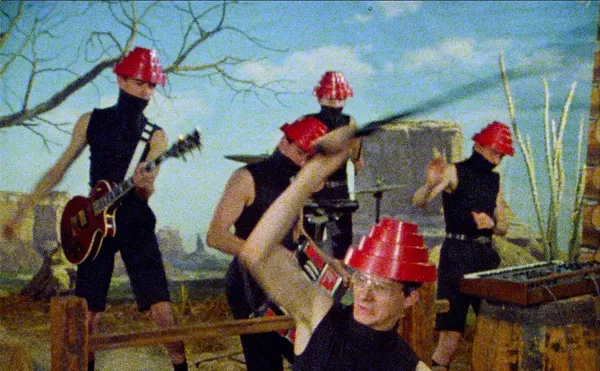It's quite possible that more great music businesses were started out of college dorm rooms than from any other field of endeavor. Think about it: Allen Klein and Don Kirshner met as dorm roommates; the stories of the Beatles, Rolling Stones, Sam Cooke, the Brill Building pop explosion, the Monkees and rock on TV in general — that is, the history of rock 'n' roll itself — would have been vastly different without them. And then, of course, there's Rick Rubin, who launched Def Jam Records out of his Manhattan dorm room. Today, one of the world's most famous producers (he's working on Kid Rock's next album), Rubin's label and brand have been responsible for an amazing list of musical projects, from the early Run-DMC and Beastie Boys days through the Black Crowes and Johnny Cash's final recordings. Currently the head of Columbia Records, Rubin was tagged by the New York Times several years ago as the one man who could possibly "save" the music business.
Two music entrepreneurs closer to home who started their careers in college are Sam Valenti IV, who runs Ann Arbor's Ghostly International, a leading player in the electro-pop market as home to two of America's best-known electronic labels, and who originally began the label (first as a platform and outlet for artist Matthew Dear) as a freshman at the University of Michigan in 1998; and DJ Graffiti (aka Martin Smith), who has an undergraduate business school degree, as well as a law degree, from the highly competitive University of Michigan, and who's parlayed what began as a dorm-floor DJ career into two full-service music marketing, management and design companies.
Interestingly, both men admit to be inspired by the Rubin example.
"I definitely was a follower of the Def Jam story," Valenti says, "and I liked it a lot. It seems like the most interesting music always comes from left-of-center ideals and not necessarily just trendy scenes. And that's why their innovation is lasting, unlike faddish sounds or styles that try to be successful by simply mining and miming what's currently popular."
"The point where that proverbial light really came on for me was when a promotions company that I was involved with, Tribe Entertainment, threw a release party for the Def Jam videogame, Vendetta," Smith says. "That was the first time I was able to provide a platform for a corporate sponsor to reach the market I was targeting. And from there on, I knew marketing was what I wanted to do, especially as a member of the hip-hop generation. Ironically, a couple of years later, we were called into the U-M Law School quad to take our class photo and I happened to be wearing a Def Jam Vendetta T-shirt. One of my current partners in my company A-Side Worldwide, Josh Remsberg, in fact, was actually an intern at Def Jam and made that whole Vendetta event come together."
Beyond Rubin, though, the catalyst behind their music careers was pretty organic for both executives ... and in fairly similar ways.
"DJing in high school and college exposed me to a lot of great music," Valenti says, "both the classic Detroit labels and a lot of exciting music that was coming out of the UK at the time, around 1997 and '98. I just loved the presentation of those labels and the diverse nature of their musical output. So I just thought there should be a U.S. imprint with that same unique approach."
For his part, Smith "caught the business bug long before college." He had Detroit-area businesses while still in high school that included printing bumper stickers and distributing mail-order catalogs. "Then my freshman year of college in Couzens Hall, my whole floor would walk around campus in a big group, going from one frat party to the next. Some of the DJs — this would have been 1996 — were horrible. I kept complaining until my friends said, "Well, if you think you can do better, then you should be a DJ.' So that's exactly what I did."
DJ Graffiti's rep on campus spread via word-of-mouth, beginning with those fellow students on his dorm floor. "By the time second semester came around, I started getting paid to DJ at student events. Philosophy was my favorite subject — but when I went to my philosophy instructor and asked what I can do with a philosophy degree besides teach, he answered, ‘Nothing.' So eventually my father suggested I go into business and that was perfect."
It was perhaps appropriate for his eventual role as a tastemaker that Valenti got his art history degree, a major he believes helped with what he does today.
"I think the way that one art movement grows and takes hold, and then is overthrown by another art movement, was very inspiring to me."
As for his secondary degree, Smith says, "I went to law school because people always said, ‘You speak well. You should be a lawyer. In all honesty, though, I used those three years in law school to buy some time so I wouldn't have to work for anyone else while starting my own company. But people often ask why I'm not using my law degree today and the truth is I use it everyday. I focused on intellectual properties in law school, so I'm regularly writing my own contracts in addition to negotiating licensing, sample clearance and all the other intellectual property issues in music. And my company is managing various artists — most of them from Michigan — so I'm always using my degrees. A law degree was also huge in helping me to establish some of my first business relationships because it's hard to have a corporation take you seriously when you're only 22," says the now 30-year-old businessman.
Like those New York legends before them, Valenti and Smith have seen humble dorm room beginnings grow into much bigger things.
"The advantage to running a business out of the dorm was that my parents were paying the rent," Smith says bluntly, "but as soon as I graduated, they politely told me, ‘Great job. We love you. You're cut off now.' The main disadvantage was that my roommate's basketball shoes would always stink and there was no way to get away from them, living in a dorm that was 10 by 12! Seriously, though, the location was a great advantage because I lived on a floor that was filled with all my friends so they became my first sales team, pitching me as a DJ."
Still, neither thinks their success was just a happy accident, either. "I'm not sure how big we are," Valenti says in response to a writer calling his company exactly that. "I just think we've been around for a bit now. If anything, I think the happy accident was meeting so many great people. But we definitely wanted to build up to what we are today, even as the genres and styles continue to change. The main idea behind Ghostly was that it was all created by and from people in the community offering their talents and time. While we have employees in different cities now, the heart and soul of the label is still in Michigan and our only true office is in Ann Arbor. I like that I've now seen generations come up inspired by our artists. And I like that those artists continue to inspire the next generation. That's how underground music evolves and survives. It's the tradition of inspiration and making people realize that they can do whatever they dream."
Smith basically agrees: "It's been more of a slow and steady progression than a happy accident," he says. "I definitely haven't always known exactly what my next step would be or I probably would have cut out a lot of missteps in the beginning. But I've known the general direction for quite some time now. Even so, I never really thought too much about my dorm room experience at the time, aside from wishing that it had a few more rooms. I definitely didn't have a full grasp of the foundation I was laying while I was still living in that dorm room." He pauses. "But in retrospect, when I think of how much everything I do was tied into that one Def Jam Vendetta event, well, maybe it was more of a happy accident. But I still prefer to view it as God's plan."
Bill Holdship is music editor of Metro Times. Send comments to mailto:[email protected]





